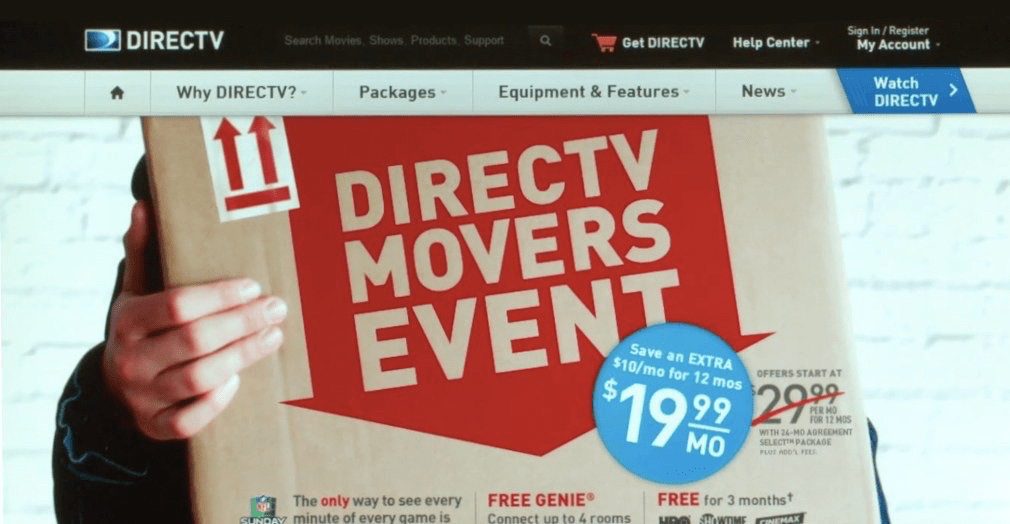Data has become a vital part of marketing strategies world-wide. How can marketers leverage it?
Data provides marketers with an opportunity to overcome challenges by offering a deeper understanding of the needs of their customers and anticipating their next move. It helps them design campaigns that drive up the sales numbers.
US-based satellite media provider DIRECTV used a data-driven personalised marketing campaign to target potential customers. Using various data points, the company identified a specific market to target – people who have recently moved to a new home. DIRECTV obtained demographic data from the USPS’s list of recent movers and customised the Home Page of their website for recent movers.

The result? The data-driven campaign with personalised content yielded a double-digit increase in conversion rate for DIRECTV. “It was one of the first times we really saw the power of the tools working together,” said Matt Donovan, DIRECTV’s manager of digital marketing, adding, “It’s been exciting to see how we can use the tools to be smart about content and not have to add to the offer to drive conversion continually.”
Also Read: The Evolution of the Independent Data-driven Marketer
Data-driven marketing refers to marketing strategies that are designed using insights from the analysis of customer data available. This data can be collected through customer interactions and engagements across various channels and touch-points, helping predict future customer behaviour. The strategies and campaigns are built on understanding the data marketers have access to, as well as the data from predictive analytics or other sources. The goal of a data-driven marketing campaign is to enhance customer experience, increasing marketing ROI, and drive sales.
Studies say that marketers are spending over USD 6 billion per year on data-driven targeting solutions like data management platforms (DMPs) and demand side platforms (DSPs) to support their marketing efforts. Many teams are not known to have wholly activated their data.
Challenges of Data-driven Marketing Campaigns
There are many challenges that marketers face when drawing up a marketing campaign built on customer data. These include:
1. Siloed Data
In most organisations, customer data is available through various customer interactions across different channels. Each department has access to this data. However, not every department is privy to all the data acquired with varying goals in mind. A successful data-driven campaign is largely dependent on obtaining integrated and high-quality data that isn’t in siloes.
2. Data Integration
Data integration aims to combine disparate sets of data in different siloes into meaningful insights that can be leveraged by marketers. However, this requires an accurate understanding of all the data sources and data sets, proper handling of changes in data over time, as well as mapping of the acquired data from one source to another. Integrating data across silos is quite challenging. Creating one cohesive, reliable, and a secure data source is essential for effective marketing efforts.
3. Locating Actionable Data
There’s no point integrating all your data across sources if it isn’t actionable. Marketers must work only on actionable data allowing them to identify patterns, correlations, and relevant relationships between various data sets. A data visualisation tool can help identify correlations between different data sets.
Also Read: Understanding and Influencing Customer Behaviour Using Customer Data
Benefits of a Data-driven Approach to Marketing
According to The Global Review of Data-Driven Marketing and Advertising, a white paper by MediaMath, The Winterberry Group, and the Global DMA:
- 77 per cent of marketers are confident in the data-driven approach, and 74 per cent expect to increase data marketing budgets.
- 69 per cent of marketers first focuses on offers, messages and content marketing in their data efforts, second on a data-driven strategy or data-driven product development, and third on customer experience optimisation.
- 53 per cent of think that among the key drivers of increased data marketing is the need to be more customer-centric, maximising efficiency and return, and gaining more knowledge of customers and prospects.
Both businesses and consumers are set to benefit from a data-driven approach to marketing.
1. Personalisation in Marketing
Customers expect a certain amount of understanding of their needs from brands. Data-driven marketing allows organisations and marketers to create campaigns that are customised to target specific customers. It converts leads through a deeper understanding of the customer profile, enabling brands to deliver highly personalised messages to their customers. A McKinsey study found that data-driven personalised marketing campaigns led to greater ROI on marketing spend. Combining target-specific personalised marketing with optimum delivery time will boost the effectiveness of the campaign.
2. Better Product Development
A well-integrated database provides marketers with a wealth of information which they can sift through to determine accurate and actionable information about their customers and prospects. A data-driven approach helps marketers target specific groups of audiences with a product they want. It removes most of the risks involved in launching a new product, diminishing product failure rates. Armed with a better understanding of their target audiences through available data, marketers can help their brand offer better-suited products for their target audience.
3. Enhanced Customer Experience
By leveraging data to extend their reach across multiple networks, marketers can use their data-driven approach to distribute ads across channels. Ad agencies and marketers are leveraging algorithms and machine learning to remove the guesswork from media planning and buying. Ad spends, and marketing messages are now optimised to reach appropriate targets. It ensures consistent, aligned, and targeted marketing campaign that brings results. This, in turn, refines customer experience as it helps identify areas of improvement for marketers, and guarantees customer satisfaction.
Personalisation leads to better customer experience. A Forbes article reported that 40 per cent of US consumers say they have purchased something more expensive than they planned to because of personalised service.
Also Read: IBM Study Finds That the Middle East Has the Highest Number of Data Breach Records
To consolidate all the data you have about your customers, it is advisable to add a good Data Management Platform (DMP) to your MarTech Stack. Based on the marketing team’s requirement, and budget, CMOs can opt for solutions available in the market. According to G2, the global user review site, the following are the top 10 DMP providers in 2019:
- Salesforce Audience Studio
- Oracle Data Cloud
- Openprise Data Orchestration Platform
- SAS/ACCESS
- com Data Management Platform
- Clearbit
- Google Audience Center
- Lotame
- MediaMath TerminalOne Marketing Operating System
- Nielsen DMP
More marketers are opting for data-driven solutions, with predictive analytics and artificial intelligence-driven marketing. The needs of the customers are ever-evolving, and they expect personalised experiences from brands. A data-driven approach is the best way forward to achieving higher success rates for your marketing campaigns.









